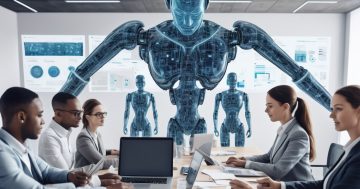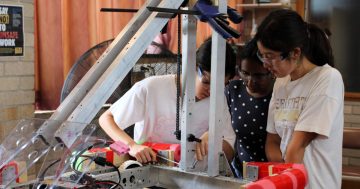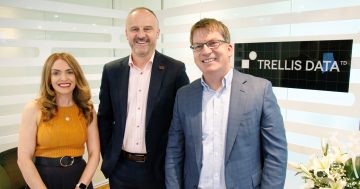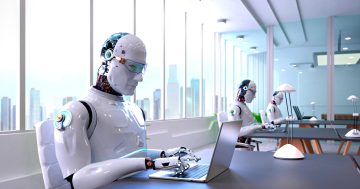In an effort to reassure senior HR executives in Los Angeles recently *Nicole Lewis reports on analyst Josh Bersin who found himself explaining.
 Josh Bersin, CEO of The Josh Bersin Company; Tracey Franklin, CHRO at Moderna; and Michael Fraccaro, chief people officer at Mastercard, fielded questions from journalists about their experiences using AI tools and their expectations of how their companies will use generative AI to meet their business needs.
Josh Bersin, CEO of The Josh Bersin Company; Tracey Franklin, CHRO at Moderna; and Michael Fraccaro, chief people officer at Mastercard, fielded questions from journalists about their experiences using AI tools and their expectations of how their companies will use generative AI to meet their business needs.
Describing attendees as “worried” about predictions that generative AI will replace jobs, Bersin said so far, the AI tools used in HR technology have turned out to be a game changer that have identified skills faster, improved recruiting and training processes, and enhanced talent mobility efforts.
However, while there are huge benefits for companies that use the technology, Bersin said many C-suite executives will see generative AI as an excuse to lay off employees.
“Of course companies are going to try to eliminate jobs with AI. Every time there’s a new technology, that’s the first thing the CFO wants to do,” he said.
The conference comes at a time when there is growing evidence that ChatGPT, DALL·E 2, Midjourney and other generative AI tools can more completely automate work tasks.
Most HR executives have already implemented AI tools in many areas, and the software has helped them, for example, speed up the recruiting and hiring of job candidates, mitigate bias in hiring, glean insights from employee surveys, and create HR chatbots to answer questions from employees.
Generative AI, however, brings a new dimension of capabilities to the workplace. Employees now can supercharge their ability to create and innovate.
For example, generative AI can produce images for virtual or augmented reality, documents, graphs, emails, videos and product designs.
“Individual workers in virtually every job are going to be super-powered with these tools,” Bersin said.
He added that HR executives will be forced to manage organizational ingenuity on a bigger scale, and that’s going to impact work design, job structure, promotions, pay. This intelligence age “is forcing the HR function itself to reinvent itself in a new way,” Bersin said.
However, since ChatGPT was launched late last year, analysts and IT experts have generally concluded that generative AI will disrupt a workforce that is still adapting to changes wrought by the COVID-19 pandemic, such as remote and hybrid work.
HR executives are now looking at further changes that will demand new approaches and innovative strategies that enrich the employee experience and are built on culture, relationships and, in many cases, a reinvention of work itself.
While analysts conclude that generative AI will create new jobs, the sobering fact is that many jobs will be lost.
A recent report from Goldman Sachs found that across the globe, generative AI is expected to eliminate, repurpose or redefine 300 million jobs.
Another report authored by researchers from Open AI, Open Research and the University of Pennsylvania concluded that “approximately 80 percent of the U.S. workforce could have at least 10 percent of their work tasks affected by the introduction of generative pre-trained transformers (GPTs), while around 19 percent of workers may see at least 50 percent of their tasks impacted.”
Among the jobs that generative AI will impact the most are personal finance advisors and brokers, insurers, data processors, news information and publishing professionals, and credit and mortgage brokers.
While employers might be eager to replace workers with the latest version of AI, Bersin said companies will still need human beings to get work done. “Once you have a bunch of customers depending on AI, you now need people behind the scenes to train it and monitor it and make sure it’s not giving the wrong answers,” Bersin said.
Fraccaro said that while Mastercard hasn’t deployed generative AI tools yet, executives are exploring possibilities, and employees are curious about what the technology can do. He added that Mastercard has established very clear guidelines for employees, telling them it’s OK to play with the tools, but that there are some uses of generative AI that employees should avoid at the workplace.
“For example, putting together a client brief or using it in the way of interacting with a particular client. There are some, again, guardrails, because at the moment, it is still nascent,” Fraccaro said.
He also pointed out that generative AI uses large language models, and humans still need to verify the system’s responses to queries. Fraccaro added that “whether it’s the recruiter or the hiring manager, they still are accountable for what goes out there to the market.”
Currently, Mastercard uses AI tools to monitor and detect potential fraud, to screen job candidates and eliminate bias, to schedule appointments between job applicants and their hiring managers, and to drive its internal talent marketplace platform, where employees looking for opportunities within the company are matched with projects that are posted on its talent marketplace platform.
While Fraccaro expects that generative AI tools will improve over time, he said AI governance is critical to moving forward with the technology. “We’ve got an AI governance steering committee that will look at particular use cases. We want to make sure that there’s areas of focus around trust, data, and data privacy, security [and] who owns data. All of those principles are very important.”
The panel also discussed how organizations will change and what role HR executives will play as generative AI empowers employees with more knowledge delivered at faster speeds, giving them greater insights to make quicker and more informed decisions.
Franklin said that as generative AI tools are rolled out across organizations, HR executives will be faced with changes that will force them to pay attention to the ecosystem of the organization. She said how the workplace comes together to operate at a high level of effectiveness and efficiency will depend on everything from how HR executives are organised to how they’re governed to how they interact.
“HR being an architect over those things is a critical skill set as we think about moving forward,” she said.
*Nicole Lewis is a freelance journalist based in Miami.
This article first appeared in SHRM











